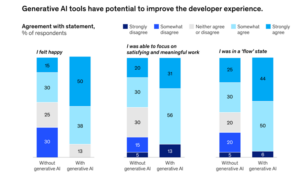
At this point, we are all familiar with the capabilities of RPA and have a cursory understanding of what AI is doing or may do to revolutionize the modern workforce. Most of the world’s top companies have some form of RPA running. With the proliferation of UiPath and Power Automate in particular, essentially every worker who has at minimum a Microsoft Office 365 license can build workflows that can automate their desktop and use an off-the-shelf version of CoPilot which can also provide answers and guidance using ChatGPT. While this sounds very exciting, and one may think the automation revolution is finally here, or is it?
I would counter to this point that the majority of ROI from RPA and AI has primarily come from Unattended or Back Office Automations. Technically, between UiPath and Microsoft alone, there is most likely a “robot for every human” available for a majority of the world’s desktop business users. Whether they know this or are allowed to use it is an entirely different question altogether. While I think the concept of Citizen Development is powerful, I think the rollout can be laborious and generally loses steam if not properly managed. Think for a moment; how many Excel users write macros and/or complex formulas, not many. That’s where I think this interaction of Citizen Development will reside until an adaptive learning tool with a proper amount of governance is created. We are not there yet.
RPA and AI promise that they will make a knowledge worker’s life easier so they can focus on higher-value tasks. My thought is we have minimally accomplished this globally. Some companies have adopted automation across the enterprise and shown huge value, but a majority have not. At this point, I have thoughts on why this tech stack hasn’t taken off yet.
- Companies aren’t realistic or have the forethought to plan for the short-, medium-, and long-term goals of intelligent automation.
- Choosing to Build vs. Buy instead of Buy vs. Build.
- Massive tech debt both from consulting firms and staff that have left the company.
- Most importantly… not providing true desktop and mobile applications that automate their day-to-day and create an effortless experience for data gathering purposes.
Since a majority of our customers are healthcare providers, I am well aware of Physician & Nurse Burnout and poor access to data in a patient’s record caused by fatigued desktop workers adhering to the system(s) they need to work on. These problems are screaming for effective desktop automation. The problem thus far is that few applications or bots have been able to provide a comprehensive solution customized to solve a specific problem in a short amount of time and be adaptable enough to change as the workflow or systems do.
The day to build one of these sophisticated tools is very close. I would even argue that with a proper concentration on the development and implementation of “best of breed” tools, data governance, security, and proper management and support on the back end, something earth-shaking could occur now. We are at the forefront of this mindset. If you look at this graphic describing how “Generative AI tools have the potential to improve the developer experience”. It shows how GenAI can vastly improve the productivity of Software developers.

Programming code is created using a keyboard. GenAI can give feedback to the programmer around the code that is to be or has been written, it understands the context and can give appropriate answers that need human review but saves a ton of time in not having to write blocks of code.
Can you imagine what this could do for doctors and nurses? Patient notes could be auto-generated, so the interaction with an EMR may not even be necessary. GPT could use RPA and AI to analyze a patient profile, provide a synopsis of the visit, give suggestions on appropriate responses, and simply let the nurse or doctor check them off. The entire interaction could be accomplished without the clinician even touching the EMR. The good news is that the data would be standardized, understandable and most importantly, there would be significant time savings and effort from the Nurses and Doctors. I am excited about this time in history as we shape the future of work with the proper tools to do so.
Written by: Peter Camp, CTO & Founder



